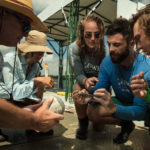UWF’s Pensacola Historic Village: a “living-learning” laboratory for UWF’s public history museum class
The days of static museum exhibits and design are over. Today's museum consumers want to participate in their environment and engage in interactive feedback. In response, museum professionals are now focusing their energy on 21st century museum interpretation. And, UWF Public History Professor Patrick Moore's "Advanced Museology" class is preparing students for this new era of museum interpretation. "If we stay rooted in 20th century ideas, we're not going to meet the needs of our population," said Moore. "So, one of the focuses of my class is on how people consume information and how we go about integrating new technology into a traditional museum mind-set and environment."
The days of static museum exhibits and design are over. Today’s museum consumers want to participate in their environment and engage in interactive feedback. In response, museum professionals are now focusing their energy on 21st century museum interpretation. And, UWF Public History Professor Patrick Moore’s “Advanced Museology” class is preparing students for this new era of museum interpretation. “If we stay rooted in 20th century ideas, we’re not going to meet the needs of our population,” said Moore. “So, one of the focuses of my class is on how people consume information and how we go about integrating new technology into a traditional museum mind-set and environment.”
Expanding on the greater context of museum operation and interpretation, the class exposes students to more complex issues, such as dealing with administration, staff and volunteers, fundraising as well as developing marketing strategies.
Utilizing Historic Pensacola Village as their classroom, students are immersed in history. Class begins with a one-week intensive course. Upon completion, students engage in hands-on field experiences, collaborating with each other and interacting with those who work in the Village. Throughout the course-which has been offered every other summer for the past decade-students learn the ins and outs of collections management, conducting tours, running a museum store, museum design and much more.
“Historic Pensacola Village serves as a ‘living-learning laboratory’ for our students, offering unique learning opportunities,” said Moore. “Where else can students and the public explore traditional museums as well as living history interpretive environments? There are a variety of ways that people can consume history here.”
The course has served as a foundation and springboard for several of Moore’s students as they advance their careers. Jonathon Creel, a second year graduate student in UWF’s Public History program, will conduct research and exhibit interpretation for Yellowstone National Park this August.
“This class covers every essential thing that I’ll need to know to work for Yellowstone,” said Creel.
To learn more about UWF’s Public History program, visit uwf.edu/history/publichistory.cfm. To learn more about Historic Pensacola Village, visit historicpensacola.org.
Written by Lauren Smith, University Marketing Communications


